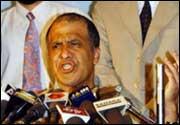|
| Help | |
| You are here: Rediff Home » India » News » Interview » Afghan Ambassador Masood Khalili |
|
Representatives from 70 countries and the United Nations meet in London [Images] this week to discuss the rebuilding of Afghanistan, the second such meeting on the country's future after the Bonn conference in 2001. Afghan President Hamid Karzai will present his development plan at the London conference and has reiterated the need for international support for his country. In a six-part exclusive interview with Managing Editor Sheela Bhatt and Nikhil Lakshman, Masood Khalili, until recently Afghanistan's long-serving ambassador to India, provides fascinating insights about his country -- its troubled transition towards democracy, the revival of the Taliban and the consequent increase in violence. During the Taliban regime, Khalili continued as the Afghan envoy to India, as a representative of the Northern Alliance, which was recognised by India and the United Nations. A close friend of the legendary Afghan commander Ahmed Shah Masood, Khalili was in the room with Masood on September 9, 2001 when two Al Qaeda [Images] assassins posing as television journalists set off a bomb that killed the 'Lion of the Panjshir.' Khalili was seriously injured and still bears the scars of that murderous attack. After Karzai took over as president of Afghanistan in 2001 after the eclipse of the Taliban regime, Khalili continued as his nation's envoy to India, a position he gave up at the end of last year, to move to Turkey, as the Afghan ambassador in Ankara.
Al Qaeda, their supporters were swept from Afghanistan, but slowly and gradually they started to return. They have returned to the south and east of Afghanistan -- to very limited provinces. Their bases are Zabul and Kunar on the eastern side of Afghanistan, which borders Pakistan. And then to Paktia and Paktika, the southern provinces of Afghanistan, bordering Pakistan. The Taliban's numbers are limited, but since they are waging a guerrilla war, that has created some concern not just for the Afghans but for the Americans, NATO, the Britishers -- those who help us to not allow the return of the Taliban. In conclusion, they have returned as a force -- not a dangerous force -- and they have returned to a very limited part of Afghanistan -- maybe 10% to 15% of the country -- not in great numbers, but small numbers. Since they are waging a guerrilla war they just hit and run. In a hit and run tactic it is hard to know how many they are because a. they use small numbers; b, they avoid frontal attacks; c. they won't stay in one place; and d. they do try to expand themselves in guerrilla ways. I think this is their policy. Personally I have seen many wars, and I don't think they can be successful. Unfortunately they are not in Iran, they are not in Uzbekistan, they are not in Tajikistan, they are not in Turkmenistan. They are not in Russia [Images]. They are not in China. They are -- then one country is left -- in Pakistan. They go back and forth. You talk about the Taliban, right? 4. Above all, to make Afghanistan strong. Economically, politically, socially with democracy, institutionalised democracy. If you combine all these tactics, the Taliban, Al Qaeda, will be defeated. All will wither away slowly. Europe is blossoming, and this region could blossom much better than any other region. Central Asia is full of oil and gas. India is full of new technology, personnel. Pakistan is a great country with manpower. So all combined, South Asia could be very rich. I think it is more beneficial for Pakistan not to create problems for Afghanistan. Afghanistan is a country no one has been able to control throughout history. Part II: 'Americans should not be called occupiers' Photograph: AFP/Getty Images | |||||||||||||||||||||||||||||||||||||||||||||||||
|
|
|
| © 2008 Rediff.com India Limited. All Rights Reserved. Disclaimer | Feedback |
 Is it true, Your Excellency, that the Taliban have again become a very dangerous force in Afghanistan?
Is it true, Your Excellency, that the Taliban have again become a very dangerous force in Afghanistan?